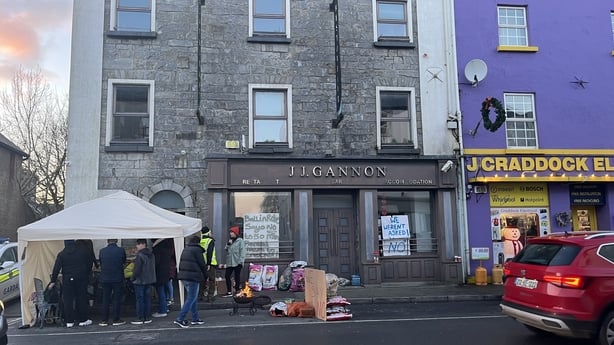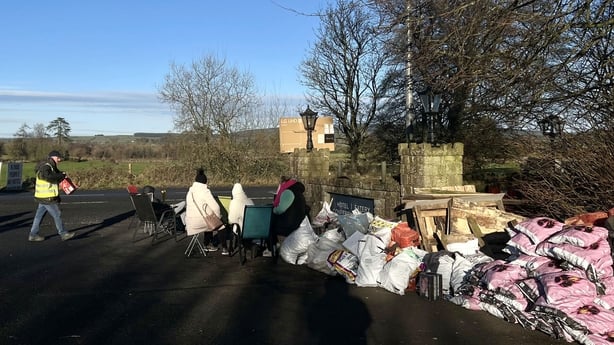The UN's Refugee Agency has appealed to protesters opposed to asylum seeker accommodation in their areas to "consider the impact of their actions" as the number of new International Protection Applicants without State-provided shelter reached an all-time high.
With a low temperature ice warning in place, both the UNHCR and the Irish Refugee Council have raised concern about the impact on those who are sleeping rough as a result.
The number of new asylum seekers without State provided shelter has passed 600 for the first time since the introduction of Direct Provision in March 2000.
It is a milestone that has been reached just six weeks after the State ceased offering accommodation to all eligible new arrivals on 4 December amid a "severe shortage".
According to the latest figures published by the Department of Integration, there are currently 601 recently arrived International Protection Applicants without any State-provided accommodation.
The highest number reached before this was 593, and this was reached on 3 May last year, when the State had similarly ceased offering accommodation to all new arrivals. But it took 14 weeks for the number to climb to that level.
Between 24 January and 15 June 2023, figures provided by the Department of Integration showed that a total of 1,542 asylum seekers were not initially offered accommodation when they first presented.
But rolling offers of sourced shelter to those who presented on a first come, first served basis meant the numbers unaccommodated never reached 600.
An analysis of the figures provided by the department shows that not only are more people being left without accommodation more quickly this time around, but that fewer are subsequently being offered places.
Since 4 December, the Government has continued to provide accommodation to women and children, although it has acknowledged that there is a scarcity of available accommodation for this group too.
Accommodation centres that were originally said to be for male asylum seekers have recently been redesignated, which is what happened in Ballinrobe in Co Mayo and in Carlow town recently, where there were protests.

A hotel that is now accommodating families in Roscrea in Co Tipperary has also been the site of protests since news of its intended use as International Protection Service Accommodation broke last Thursday.
Since 4 December, 88 men who were deemed "vulnerable" when assessed were offered accommodation.
Then, of the 688 men who were initially not offered accommodation when they initially presented seeking international protection in the past six weeks, 87 were subsequently offered a place when one became available.
Six weeks after the Government ceased offering accommodation to all new asylum seekers in January of last year, the total number initially turned away without somewhere to stay was lower at 538 on 8 March 2023, while the number subsequently offered a place was significantly higher at 321, leaving 217 without State provided shelter on that date.
Sleeping rough can not be 'normalised' - UN
The Head of Office of the UNHCR in Dublin Enda O'Neill said he was "deeply concerned" that the number of new asylum seekers in Ireland without an offer of accommodation has now risen to more than 600.
"Sleeping on the street is not safe; it can have significant health impacts and exposes people to greater risks of theft and assault, particularly with temperatures in Dublin set to fall to below zero tonight. We cannot allow this to become normalised," Mr O'Neill said.
"UNHCR appeals to those who are protesting against the provision of accommodation for asylum seekers and refugees to consider the impact of their actions on those who will have no alternative but to sleep outside, or in tents, in freezing temperatures."
Mr O'Neill said that he accepted that the Government was "facing significant challenges in securing suitable accommodation for new arrivals", but he said that it nevertheless had "a moral and legal obligation to meet the basic needs of people who come to Ireland seeking safety".
"This is an emergency situation which requires the Government to take extraordinary measures to ensure it can meet these basic humanitarian needs," he said.

Irish Refugee Council Chief Executive Nick Henderson described today as a "grim milestone".
He said: "There is no adequate plan in place to respond and address this crisis and, unless urgent action is taken, it will continue to increase sharply.
"We believe accommodation capacity exists, including in Government department stock, and flagged this in a letter to Government in December.
"It is also a breach of our obligations under Irish and EU law and those obligations cannot be ignored or wished away.
"We have met more than 95 people without accommodation. Some are sleeping rough and moving around the city, people are desperate and cold and sometimes face hostility: one person reported having his tent stolen, one assaulted.
"Some people report physical and mental health problems exacerbated by sleeping rough."
Limerick-based migrant and refugee support service Doras has said it is now seeing "newly arrived asylum seekers who are cold and destitute arriving at our Limerick office, as they have to seek shelter and safety outside of Dublin".
CEO John Lannon described today as "an unprecedented low for the International Protection Accommodation Service".
"While we are told that proposals for the building of new reception centres will go to Cabinet soon, an immediate response is required.
"Years, or even months, is too long for the people trying to survive on the streets," Mr Lannon said.
"We acknowledge that the situation is complicated by the blockading of properties, by arson attacks, and by other forms of intimidation and pressure on providers."
"But given the freezing conditions we now have, we are appealing to communities to let all available buildings be used to provide shelter."
He urged them "not to listen" to what he described as "bad faith actors that are spreading disinformation and lies about asylum seekers".
Mr Lannon also said that they were "aware of some additional unused capacity in the system".
Weekly payments
Weekly payments for asylum seekers who are not offered accommodation have been increased by €75 to €113.50.
They are also provided with the details of homeless day services.
In December the Irish Human Rights and Equality Commission brought proceedings in its own name before the High Court seeking to address what it called "the State's failure to provide for the basic needs, including shelter, of people recently arriving in Ireland and seeking asylum".
It is the first time the commission has used this legal power since its establishment.
Last April, the High Court ruled that the State's failure to provide an Afghan asylum seeker with "material reception conditions", including accommodation, shelter, food and basic hygiene, was unlawful.






